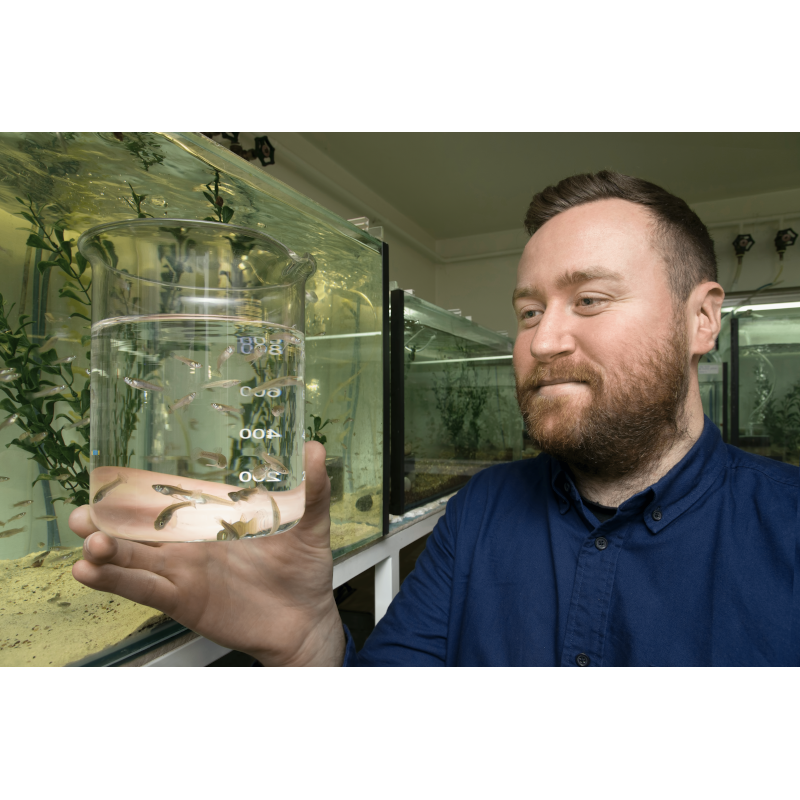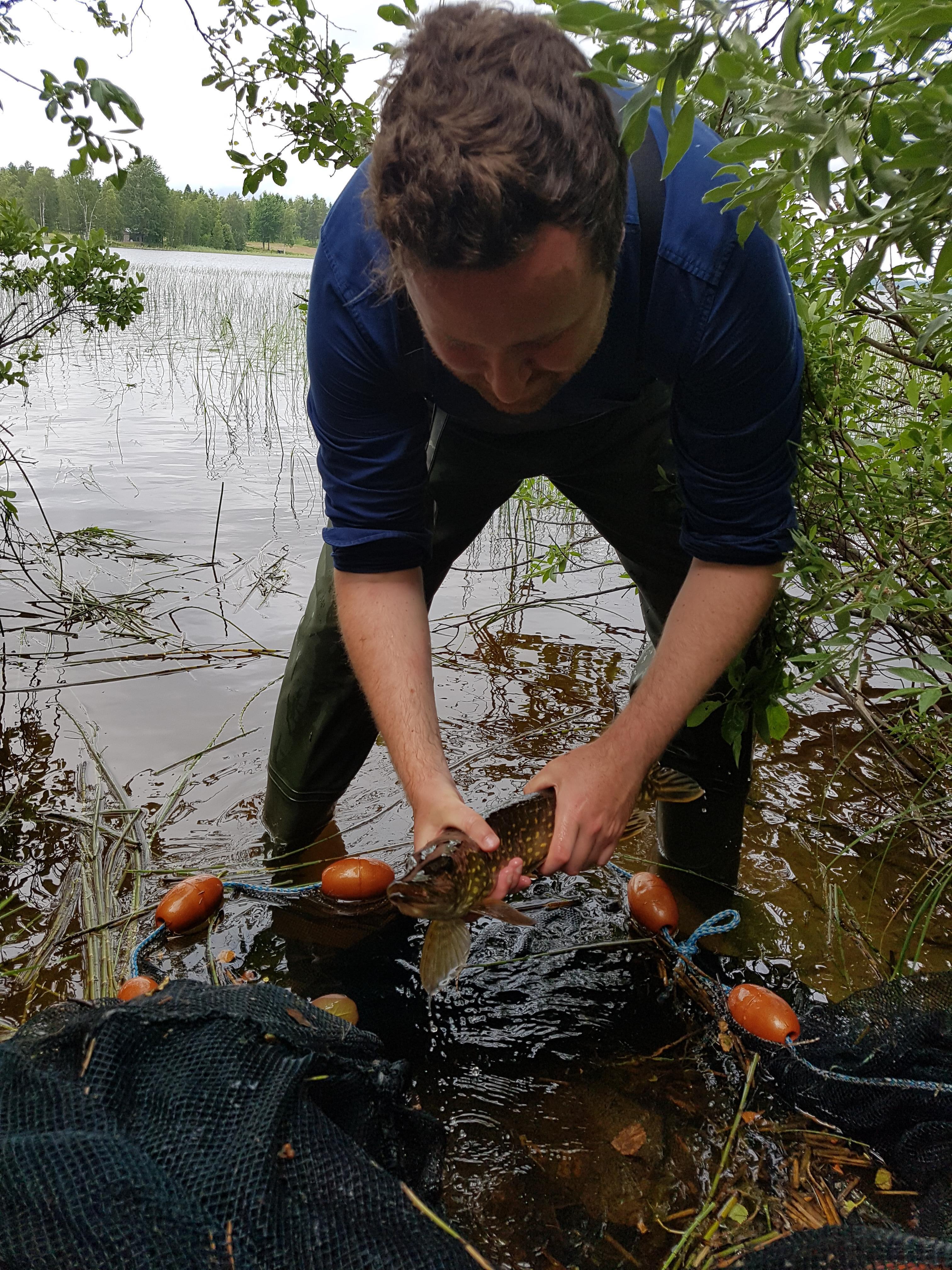We welcome Michael Bertram to the Proceedings B Editorial Board.

We are pleased to welcome a new Associate Editor to the Proceedings B Editorial Board, Michael Bertram from the Department of Wildlife, Fish, and Environmental Studies, Swedish University of Agricultural Sciences (SLU), who starts as an Associate Editor in January 2023. We asked Michael a few questions about his background, current research, and motivation behind joining the journal’s Editorial Board.

Tell us more about your field of research?
I am a behavioural ecologist interested in researching impacts of human-induced environmental change on wildlife, with a particular focus on chemical pollution. Through my work, I aim to uncover whether and how environmentally realistic exposure to ‘emerging’ contaminant classes, such as pharmaceuticals and endocrine-disrupting chemicals, disturbs key ecological and evolutionary processes in wildlife. To investigate these questions, I use a combination of laboratory and field-based approaches to test the impacts of contaminants across multiple levels of biological organisation, from individuals to populations and communities. In addition, I am increasingly interested in upscaling environmental realism in my work, which is, generally speaking, surprisingly limited in research investigating the impacts of contaminants on the behaviour of wildlife (termed ‘behavioural ecotoxicology’). This includes, for example, conducting field exposures and pairing this with cutting-edge technologies such as high-resolution acoustic telemetry, assessing the possible interactive effects of multiple stressors, examining potential impacts of contamination on group-level behavioural processes, and more.
What prompted you to work in this field?
Like many people, I was first attracted to the fields of biology and ecology by all of the weird and wonderful flora and fauna adapted to live in different environments, under different selection pressures. Then, again like many others, in learning more about biology, ecology, and environmental science I realised that, unfortunately enough, natural systems are currently imperilled by a range of anthropogenic stressors. Given this situation, I felt compelled to concentrate my research on understanding and mitigating the impacts of human-induced environmental change. Further, I chose to specialise in researching chemical pollution given that it is alarmingly widespread and particularly insidious, often disrupting biological systems even at extraordinarily low exposure levels and in complex ways that can be hard to predict. For example, the sex-reversal of aquatic wildlife exposed to endocrine-disrupting hormones from wastewater, and altered foraging and communication dances in bumblebees contaminated with insecticides. Moreover, I am passionate about increasing the quality and environmental realism of research in the rapidly growing field of behavioural ecotoxicology, including by harnessing modern technologies and experimental approaches. This is important to me given that my ultimate goal is to champion the use of behavioural data in the risk assessment and regulation of chemicals, which is currently severely lacking.
What has been the biggest influence on your career?
I have been very fortunate throughout my career to work with fantastic and inspiring students, colleagues, and mentors, who continue to have a major impact on my career. Definitely one of the most fun and rewarding aspects of my job is collaborating with talented and enthusiastic colleagues. In particular, I developed a passion for research largely thanks to my former PhD supervisor, Prof. Bob Wong (Monash University). Though I have always had an interest in nature, it was Bob's engaging lectures, filled with fascinating examples from the literature, that truly drew me into the field of behavioural ecology. From tool use in burrowing owls to sexual deception in orchids, his undergraduate lectures were always captivating and made an indelible impression on me. I was also very lucky to have an inspiring postdoctoral supervisor in Prof. Tomas Brodin (Swedish University of Agricultural Sciences), who’s ambitious, large-scale experiments and deep ecological knowledge motivated me to expand my research program and ask big and bold questions. While such large-scale experiments can be daunting, they are a crucially important compliment to laboratory-based studies when investigating impacts of anthropogenic change on animals living in an increasingly toxic world.
Why did you join the Proceedings B Editorial Board?
As an Associate Editor for Proceedings B, I am excited to have the opportunity to engage more closely with leading biology and ecology researchers from around the world on the Editorial Board. Among the main reasons I was interested in this role is my desire to see more applied research being published in the journal that addresses the impacts of human-induced environmental change. All ecosystems on Earth are now impacted by human activities and we urgently need more high-quality research to understand the impacts of these changes, and what can be done to protect vulnerable wildlife and ecosystems. Further, I was eager to join the Editorial Board of Proceedings B because, even as far back as my undergraduate days, it has always been a journal for which I have a lot of respect. I found many of my favourite papers while reading through the pages of Proceedings B and so I look forward to giving something back to the journal.
What advice would you give to someone who wants to submit to Proceedings B?
Ensuring that your work is both conceptually unique and capable of capturing the attention of a wide audience should be among your top priorities when submitting to Proceedings B. In particular, given the journal's interdisciplinary nature, it's important that submitted work is comprehensible and interesting to a diverse range of scientists from various fields. Furthermore, if your article is accepted in Proceedings B, in my opinion it is important to be open and transparent, by for example publicly archiving your data and code. In this regard, it is becoming progressively acknowledged within the field of biology that open, reproducible, and transparent research methods are beneficial not only for scientific advancement but also for society as a whole.
Proceedings B is looking to publish more high-quality research articles and reviews in behavioural ecology and environmental science. If you have an idea for a review, we strongly encourage you to submit a proposal. Find out more about the submission process.
Image credits:
Steve Morton - Michael holding a beaker
Annelie Lagesson - Michael at the lake





